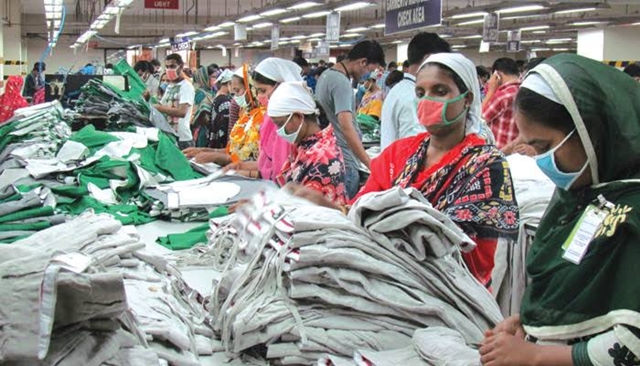Abu Taher Bappa
Published:2019-12-18 23:26:50 BdST
RMG export drops 6.61pc in July-Nov
FT ONLINE
The country's ready-made garment (RMG) export to major non-traditional markets witnessed a negative growth of 6.61 percent during the first five months of the current fiscal year (FY), 2019-20, according to data.
Industry people said Australia, Brazil, Chile, China, India, Japan, Korea, Mexico, Russia, South Africa and Turkey are 11 prospective markets for local RMG items beyond their three traditional export destinations - the European Union (EU), the US and Canada.
Export of apparel items to non-traditional markets, including these 11 prospective ones and excepting India, Korea and Mexico, witnessed a negative growth, the Bangladesh Garment Manufacturers and Exporters Association (BGMEA) data revealed.
Bangladeshi RMG sector earned US$ 2.24 billion from the non-traditional markets during the July-November period of FY 20, which was $2.40 billion in the corresponding period of last fiscal.
Export to Brazil, China, South Africa and Turkey witnessed a negative growth of 34.12 percent, 21.47 percent, 19.47 percent and 34.92 percent respectively during the period.
RMG export declined by 7.17 percent, 4.50 percent and 2.74 percent to Australia, Japan and Russia respectively, while it fell by less than 1.0 percent in Chile during the first five months of current FY, data showed.
The non-traditional markets accounted for 16.66 percent or $5.68 billion of the country's total garment export volume worth $34.13 billion in FY 19.
Export receipts from the non-traditional markets witnessed a 21.77 percent growth in the last FY. More than 76 percent of the earning from the non-traditional markets came from these 11 potential ones.
The RMG export in traditional markets - the EU, the US and Canada - also fell by 8.51 percent, 5.17 percent and 13.15 percent respectively during the July-November period of FY 20.
Apparel exporters attributed the poor performance of the RMG sector to a number of factors, including sluggish global demand, a decline in the price of products, the US-China trade war tension, devaluation of currencies in major competitor countries, and high duty in some non-traditional markets.
When asked, BGMEA President Dr. Rubana Huq said "We need product diversification as well as shifting our over-concentration on cotton items."
There are product mismatches in new markets too, she said, suggesting paying more attention to new markets.
Citing data, she noted that the knitted cotton t-shirt was the top export item this week, and its export witnessed negative growth both in terms of value and volume.
On the other hand, knitted non-cotton jersey and pullovers were the top declining products of the current week, whereas prices of the items increased.
Ms. Huq added that export values of 13 out of the top 20 items have declined this year, while prices of nine out of the top 20 items have also dropped.
Terming Brazil one of the potential markets, an exporter blamed high duty and absence of continuous efforts behind failure to grab the largest among the South American markets.
Besides, export to Turkey is also declining, as the country has taken safeguard measures for its local industry by imposing a supplementary duty on apparel products, he added.
Unauthorized use or reproduction of The Finance Today content for commercial purposes is strictly prohibited.


